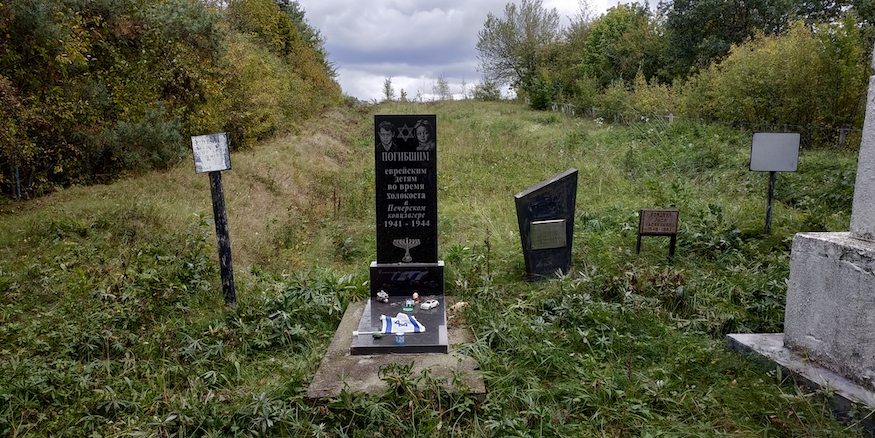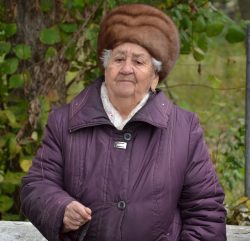Tending a Mass Grave
By Marijke Terlouw and Carmen Ullersma.. Rita Schweibes (picture below) was born 30 August 1936 in Tulchin, Ukraine. Many people who have travelled to Ukraine with us have met her and heard her story about how she survived the hardships of the Holocaust in the ghetto of Pechora. You can read more about her life in this interview.
“I remember the first time Christians for Israel visited with food parcels ten years ago. The buses drove up and stopped in front of the museum. The busses were packed full of food parcels, humanitarian aid, toys and clothing. Ten years ago there were a lot more Jews than there are now. More Holocaust survivors were still living.”
Before the War
“I can’t remember much of the period before the war. I was just five years old when it started. There was a large Jewish community in Tulchin, in addition to the Polish and Ukrainian communities. There were ten synagogues in total. My mother stayed at home, and my father worked in the sewing factory. I had two brothers. One joined the army, and one went to the Pechora ghetto with us. Life was different in the Soviet period. There was no place for religion. But at that time, before the war, people were kinder to Jews. Right before the war started, my parents were able to acquire their own apartment. They didn’t even have time to furnish it. The bombardment of Tulchin started, and they bombed the building where my parents had the apartment. Part of the building survived and the other part was completely destroyed. After that, we stayed in other people’s foyers, hallways or storage rooms. Each day we stayed somewhere else. People took turns feeding us: someone else every day.
Return to Tulchin
“When the war started, my father helped with the evacuation of the Jewish community. Because of this, we were the last to leave. We hired a horse and wagon and my parents, brother, grandmother and I left in the direction of Dnepropetrovsk. Six kilometres before the city we saw that the road was blocked off by German and Italian soldiers. We had to turn around. When we got back, we saw that the house we had left from was empty. The table was gone, the beds were gone; everything had been stolen. I was five years old at the time. I saw that the neighbour girl had my doll. I started to cry and said, ‘Give my doll back.’ I can still remember that.”
In December 1941 Rita and many other Jewish children were driven together into the Jewish school. The Romanian occupiers and the Germans gave the children injections. The injections did not contain vaccines against diseases, but the diseases themselves, so that the children got tuberculosis and typhus. Afterwards, the prisoners had to walk forty kilometres through the freezing cold to the concentration camp in Pechora. Many died due to the extreme hardships.
Rita was imprisoned in Pechora for years. The conditions were horrendous. There were no gas chambers, but the prisoners were tortured, raped, and systematically starved. Rita’s father was murdered by the German soldiers. One month later her mother died of sickness, hunger and sorrow. As a young girl herself, Rita cared for her younger brother who became crazy with sorrow and suffering.
Tending a Mass Grave
“The mass grave is a wound that always aches. Sixty-two thousand Jewish people are buried there. They were not only Jews from Tulchin but also Moldavia, Romania, Mogolov-Podolski and other places. As long as I live, I will care for it. I make sure that someone mows the grass there. I am thankful for the people who have helped me to place a monument for my mother on the mass grave. Now I can walk to her grave. It was a difficult time, our life during and after the war. I wouldn’t wish it on anybody. I am thankful to the Almighty that despite everything I survived. The Almighty gave me the strength to continue. Now I have a family, children [of my own]”
Indifference
“It seems like more and more people are indifferent towards what happened during the war. My children and grandchildren know what happened. They know the whole story. But that is not always the case with outsiders. I have two neighbours. They know that I am an elderly woman and they know about my past. One of them helps me when needed, but the other doesn’t and is indifferent.
Regardless of when or where you live, there are always some people who are very selfish. There is a lot of jealousy. But I thank God for everything. I have a place to live in. I am not hungry. Praise God. All that I ask of God is health. I don’t want to be a burden to anyone. As long as I can stand on my own two feet, I’m alright. I do have someone who helps with cleaning around the house. She is a kind, honest woman.”
His Blessing
“God is everything to me. There was a time in my life when I thought, ‘This is the last day of my life.’ But God has blessed me with another seventy years. I live for Him and love Him. We are all sinful, but one day I promised Him something. If He keeps me alive, I will tell people about the past. And that is what I am doing now. I have kept my word to Him. This is my calling and that this is what brings me to the mass grave. My mother and the other Jewish people are buried there.”
Please support the construction and maintenance of Holocaust Memorials in Ukraine. Any amount is welcome!
Support in €
Support in US $






